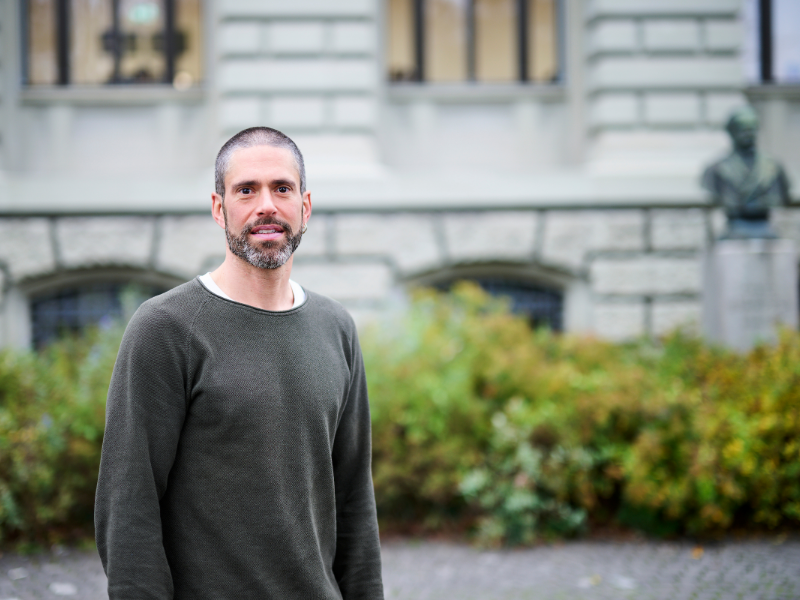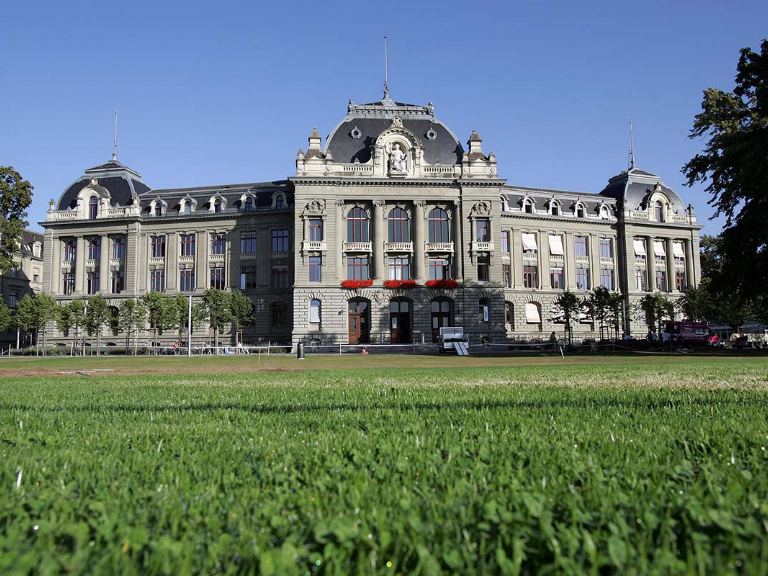30 years of the University of Bern Intermediate Staff Association
Politically committed to intermediate staff
The interests of the more than 4,000 doctoral students, assistants, postdocs, research associates and lecturers at the University of Bern are represented by the Intermediate Staff Association MVUB – and have been for 30 years now. What motivates young researchers to take part in this organization and what do they want to achieve?

Sofie Aeschlimann has a wide range of activities: She is working on her dissertation on poetry and archeology. She also writes poetry herself, writes reviews and plays in an amateur orchestra. Why is a busy young academic like her involved in the Intermediate Staff Association of the University of Bern? “Because I think it’s important to make the University better,” explains the Germanist. And: “Because I like doing it.” The collaboration on the Board of the MVUB is inspiring. “These are all motivated people from whom you can learn a lot – that’s the beauty of the MVUB and the University of Bern overall.”

Sofie Aeschlimann has been a member of the MVUB Board since April this year and is thus one of the newcomers to the current twelve-member Board – whereby: Because doctoral students are only employed at the University for a few years, there is a structurally determined coming and going on this Board. The distribution of tasks is correspondingly fluid. The entire team takes part in the regular meetings and retreats, while ongoing work is divided up on an ad hoc basis. Sofie Aeschlimann, who has just been elected to office, became part of the MVUB Delegation, which meets regularly with the University Executive Board.
Designing solutions
Korollus Melek has been a member of the MVUB Board since 2022, and recently became Co-President of the Intermediate Staff Association. He will soon be completing his dissertation in the field of cancer research. His professional future? “My goal is to remain active in a suitable role at the University.”
“Where nobody else feels responsible, we are responsible.”
- Korollus Melek
Whether and where the molecular medical specialist will find a permanent position is uncertain, but Korollus Melek is used to a mobile life: Born in Egypt, he grew up in Austria and studied in Vienna and at the Charité in Berlin. His PhD thesis then brought him to the University of Bern, where he realized that he was not only fascinated by biochemistry, but also by University policy. “I like to follow closely how this policy is being shaped and to actively contribute to possible solutions myself,” he explains.

Privileged discussion partner for the University Executive Board
The intermediate staff – doctoral students, assistants, postdocs, lecturers and research assistants – are players in higher education policy. As a representative body, the MVUB is represented on all University committees, working groups and in the Senate and is therefore part of the University’s consultation processes. And, as Co-President Melek points out, the MVUB is a privileged discussion partner for the University Executive Board. The reason: Its members include employees from all faculties and is therefore regarded as a cross-university indicator of needs – for example, when solutions and advice on how to offer course contents in the form of podcasts were given during the coronavirus pandemic.
How the intermediate staff is organized in detail may be a little confusing for outsiders. Intermediate staff organizations also exist at the faculty level. The MVUB is the University-wide association and consists of two sections: One brings together the assistants and the other the lecturers. Marc Zibung is Chair of the second section and has been in the management of the MVUB since 2018 – making him probably one of the longest-serving members of the Board. He holds a doctorate in sports science and teaches at the Institute of Sport Science, where he also works as an academic student adviser. His involvement in the Intermediate Staff Association is not least due to his own professional situation: “We lecturers have a permanent position, but we also need a representative who advocates for us and the entire intermediate staff at a political and structural level.”

As an experienced member of the MVUB, Marc Zibung represents the intermediate staff in the Senate. Most of the transactions in the University’s highest governing body are undisputed, he explains, but not all of them: Some years ago, for example, the University Executive Board wanted to abolish the Commission for International Affairs. For the intermediate staff, this would have meant a loss of opportunities to have their say, which is why the MVUB resisted the request – with success.
Baby stroller ramps, labor conflicts, dependencies
Major changes take time, while smaller concerns often produce immediate results. “Our greatest goal is to achieve structural improvements for the intermediate staff,” explains Sofie Aeschlimann. “These are very long processes, but things in the University’s regulations are constantly being improved on the initiative of the MVUB.”
According to the Board member, the fight for improvements ranges from very small to very large concerns: For example, access to University buildings with strollers was improved on the initiative of the MVUB. After all, most young parents at UniBE are part of the intermediate staff. However, the main issue at the MVUB is dependency relationships – for example, between doctoral students and their supervisors. Sofie Aeschlimann: “We are committed to ensuring that intermediate staff members can carry out their work under fair conditions. And if there are conflicts, the intermediate staff should know where to seek advice.”
“Our greatest goal is to achieve structural improvements for the intermediate staff.”
Sofie Aeschlimann
Uncertainty leads to financial worries
Are dependencies really the biggest concerns of intermediate University staff? They are certainly not the only concern. The uncertain professional future also weighs heavily on young researchers. “80% of all intermediate staff members only have fixed-term contracts,” emphasizes MVUB Co-President Korollus Melek. “That’s a huge concern, because it’s about financial worries.”
And this is precisely where the Intermediate Staff Association is in a dilemma: Many young researchers are considering an academic career, including the Board members interviewed, but it is well known that permanent positions as professors are sparse, and the MVUB can hardly change anything about this fundamental problem in the academic world. Korollus Melek is also aware of this. But if, according to his motto, there is little the MVUB can do to make a fundamental change possible for the professional future of intermediate staff, then at least they want to contribute to ensuring that doctoral students and postdocs can make the most of their time at the University.
Information and advice from the MVUB
This refers to good framework conditions to which the MVUB can contribute. Fair doctoral agreements, for example, or the dual control principle, which ensures that doctoral students are supervised by two supervisors in order to prevent abuse in the unavoidable relationships of dependency.
“The dependency relationships among doctoral students and postdocs harbor great potential for abuse.”
– Marc Zibung
Another topic is the working conditions of postdocs. They must be employed at least 80%, as the MVUB demands, otherwise there is a risk of them working for nothing. Above all, however, the Intermediate Staff Association sees itself as a hub for information and advice in the event of conflicts. “We might not always be able to provide help ourselves, but we have an overview of the wide range of advisory services offered at the University,” emphasizes Korollus Melek.
In difficult moments of working life, such a point of contact is worth its weight in gold for MVUB members. That’s why it’s clear: Even after 30 years of commitment to the interests of intermediate staff, the MVUB has by no means made itself superfluous.
ABOUT THE PEOPLE
Sofie Aeschlimann (27)
iis a doctoral student at the Institute of Germanic Languages and Literatures and a member of the Board of the MVUB
Contact
Korollus Melek (28)
is a doctoral student at the Institute of Biochemistry and Molecular Medicine and Co-President of the MVUB
Contact
Marc Zibung (44)
is a lecturer at the Institute of Sport Science and a member of the Board of the MVUB
Contact
The Intermediate Staff Association (MVUB)
The Intermediate Staff Association of the University of Bern represents the more than 4,000 intermediate staff members of the University of Bern in their academic and professional interests vis-à-vis University and non-University bodies and authorities. The core tasks of the MVUB are representation, networking and support. It is organized as an association, has over 800 individual members and 12 collective members (with around 1,680 people) and has a professional office managed by Sandra Zumbrunn and Fabienne Brawand.


